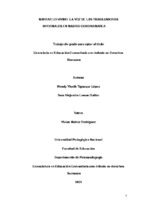Narrar lo vivido : la voz de las trabajadoras informales en Madrid Cundinamarca.
Citación
Fecha
2023Autor
Lemus Gaitan, Sara Alejandra
Tiguaque López, Wendy Yiseth
Director / Asesor / Tutor
Muñoz Rodríguez, Vivian
Palabras claves
Trabajo informal
Mujer trabajadora informal
División sexual del trabajo
Economía del cuidado
Feminización del trabajo
Relatos de vida
Keyword
Informal workCasual working woman
Sexual division of labor
Care economy
Feminization of work
Life stories
Metadatos
Mostrar el registro completo del ítemResumen
Este documento muestra el proceso investigativo denominado “Narrando lo vivido, la voz de los trabajadores informales en Madrid Cundinamarca” Trabajo que centra su atención en el sector laboral informal, desde sus diversas formas y escenarios, ya sea ambulante, de calle, negocios no legalizados y contratación en pequeños negocios, donde no se brindan beneficios legales.
Este proceso se desarrolla inicialmente con la población de trabajadores informales del municipio, donde fue fundamental desarrollar apoyo y generar vínculos con los trabajadores participantes en reuniones y negociaciones, que permitieron acercarse a la realidad de la informalidad laboral en el municipio.
El segundo momento surge de las necesidades y problemáticas que se evidenciaron generando interés en el rol de las mujeres en el trabajo informal y las causas que las conducen hacia él. Para abordar la problemática del rol de la mujer en el trabajo informal y su alta presencia en el municipio, se trabaja en torno a la construcción de historias de vida de mujeres trabajadoras informales, como herramienta metodológica cualitativa. Centrándonos en tres trabajadoras informales, quienes serán las protagonistas del presente trabajo de grado
Abstract
This document shows the investigative process called “Narrating what was experienced, the voice of the informal workers in Madrid Cundinamarca” Work that focuses its attention on the informal work sector, from its various forms and scenarios, whether traveling or on the street. , non-legalized business, and contracting in small businesses, where legal benefits are not provided.
This process is developed initially with the population of informal workers of the municipality, where it was essential to develop support and generate links with the workers participating in the
meetings and negotiations, which made it possible to approach the reality of labor informality in the municipality.
The second moment arises from the needs and problems that were evident, generating interest in the role of women in informal work and the causes that lead them towards it. In order to address the problem of the role of women in informal work and their high presence in the municipality, the teachers in training work around the construction of life stories of women informal workers, as a qualitative methodological tool. Focusing on three informal women workers, who will be the protagonists of the
present degree work
Editorial
Universidad Pedagógica Nacional
Programa académico
Licenciatura en Educación Comunitaria con énfasis en DDHH

